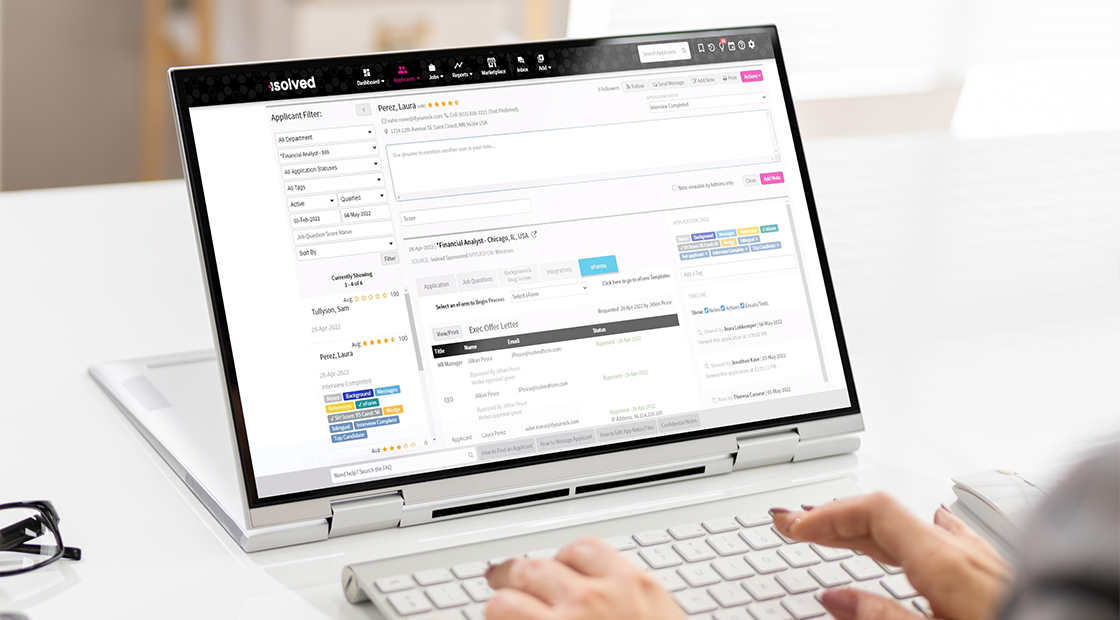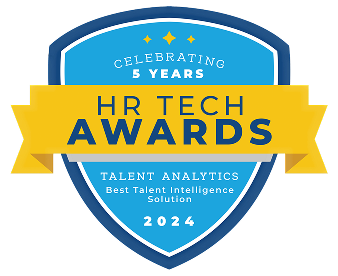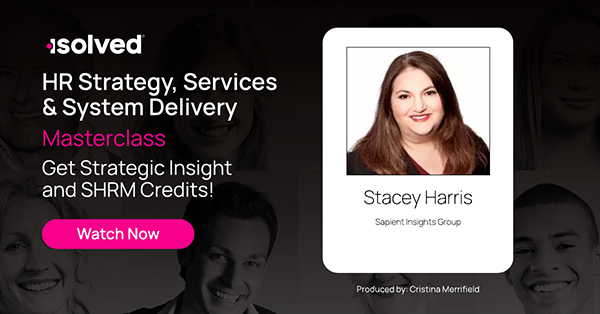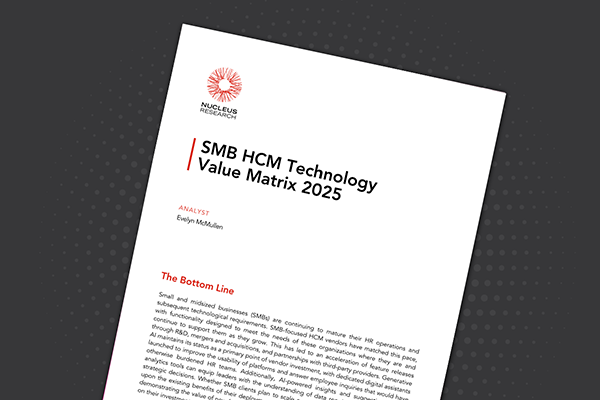HR Software
Simplify HR Tasks with an All-in-One HR Solution
Reduce the burden and workload for teams with isolved’s robust human resources (HR) platform. Automate workflows, improve HR agility and minimize compliance risk while delivering an exceptional employee experience.

Enterprise-Ready Features for Businesses of All Sizes
As organizations evolve and workforce complexities increase, your HR team faces a growing list of responsibilities, including providing more engaging and personalized workplace experiences. But keeping up with the rapid pace of change can hinder your capacity to take care of your people and maximize business efficiency without sacrificing scale.

Automate HR Processes
Improve your team’s efficiency and responsiveness by automating core HR functions like reviewing requests, creating actionable reports and more.
Centralize Employee Data
Easily collect and track employee information with paperless collection of required documents, certifications and job and salary history accessible within a few clicks.
Improve Employee Engagement
Offer employees mobile access to an intuitive self-service portal so they can submit requests, access important documents and update personal information from anywhere.
Increase Retention Rates
Improve engagement through an employee self-service portal with mobile access that makes time tracking, PTO requests, benefit enrollment and other tasks simple.
Reduce Compliance Risks
View and manage all employee documents, including OSHA reporting and electronic signature consent while simplifying reporting for ERISA, ACA and more in one secure place.
Create Customizable Reports
Access real-time data to generate comprehensive reports and track key analytics while accessing valuable workforce information.
Take a Quick Tour
Watch a short video to see how easy it is to simplify administrative tasks with our HR software solution.
Watch our overview video to learn more.
Elevate Your HR Functions
Unlock your team's efficiency with a unified, yet modular, human capital management (HCM) platform that empowers you to do everything in one solution.
Simplify Payroll Processing
Improve payroll runs with automation while ensuring accurate compensation and compliance.
Online Benefits Enrollment
Consolidate HR functions and benefit administration into one easy-to-use system to gain efficiency.
Develop Employee Skills
Nurture professional growth with interactive courses while engaging employees through gamification that gives them opportunities to earn rewards.
Find and Attract Top Talent
Leverage our applicant tracking system to help your teams quickly fill open roles with enhanced processes at every step along the way, from job postings to final candidate approvals.
Onboard New Hires Faster
Offer a fully digital employee onboarding experience with a cloud-based system that gathers and stores all required documents within a few clicks and gets new hires productive, quickly.
Streamline Talent Management
Give teams a talent management system that makes it easy to access handbooks, complete performance reviews and more.
“With isolved, you are buying more than just a product, you are partnering with exceptional service and expert knowledge. This creates more than just a purchase of isolved, it creates and continues to increase the value of the partnership that is more than just an HCM product.”
— Stephen Arena, HR Director at Key Training Center

Augment Your Team with Dedicated HR Services
Need full-service HR assistance?
Give your team the human resources support they need to focus on business growth and key initiatives. isolved offers tailored HR service plans for organizations of all sizes across all industries.
Build Culture and Knowledge With On-Demand Courses
Equip your teams with all the resources they need to stay compliant, minimize risk and master essential workplace skills.
Our HR Compliance Track offers a curated selection of interactive courses that fulfill requirements for major federal and state regulations like data protection, and foster a positive organizational culture with ethics training and sexual harassment awareness. Plus, develop employee skills including conflict resolution and emotionally intelligent leadership.

Get Next-Level HR Technology with Pre-Built Integrations
isolved Marketplace offers a wide variety of integrations using secure API connections. Explore our library of applications you can integrate with People Cloud.
Expand Your HR Knowledge
Stay on top of the latest news in HR technology and trends.

HR Leaders Report
Discover current industry insights and trends for HR departments in the age of artificial intelligence (AI) in our annual SWOT analysis.
Download Whitepaper
HR Strategy Masterclass
See how organizations of all sizes harness the power of HR technology to drive meaningful business outcomes.
Watch the Webinar
SMB HCM Value Matrix
Nucleus Research names isolved as a leader of HCM technology for SMBs for the second consecutive year.
Download ReportHuman Resources FAQs
What is HR Software?
HR software, also known as a human resources information system (HRIS) or human resources management system (HRMS), is a digital solution that helps HR professionals manage employee data, track compliance, automate administrative tasks and support people management. It typically includes modules for hiring, onboarding, offboarding, benefits administration, time tracking and performance management.
Modern HR software supports business needs by offering centralized access to HR data, customizable templates, permission-based access controls and mobile app functionality. It improves decision-making by providing real-time insights into workforce metrics and streamlining workflows. Many platforms also include built-in customer support to assist with technical and functional questions.
What are the main types of HR systems?
The main types of HR systems include:
- HRIS (Human Resources Information System): Focuses on core HR functions such as employee data, benefits administration, payroll processing and compliance tracking.
- HRMS (Human Resources Management System): Includes HRIS features and adds modules for onboarding, offboarding, performance management, time tracking and workforce management.
- HCM (Human Capital Management): Expands HRMS by supporting broader talent management, employee engagement, retention strategies and long-term workforce planning.
These systems help automate HR tasks, support decision-making and streamline workflows. Most platforms are cloud-based, user-friendly and offer mobile app functionality, customizable templates and integrations with payroll software and other HR tools.
Why is HR software important?
Human resources software helps HR professionals automate repetitive tasks, manage employee data and streamline HR processes such as onboarding, offboarding, benefits administration, payroll processing and time tracking. It supports better decision-making with real-time access to HR data and reduces manual errors in core HR functions. This allows HR teams to focus on strategy and people management rather than administrative tasks.
HR software also improves the employee experience through mobile app access, self-service tools and customizable templates for approvals, handbooks and checklists. Cloud-based platforms often include integrations with applicant tracking systems, payroll software and other HR tools, making them scalable for small businesses and larger teams. Many systems include built-in customer support and flexible pricing based on modules or business needs.

